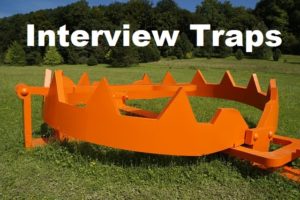It is not when YOU pause that destroys you.
Silence is golden when you can’t think of a good answer. (Muhammed Ali)
An interviewer said, “Tell me what your biggest weakness is.” The candidate gave one example. There was a pause. The interviewer looked puzzled. Uncomfortable, the candidate gave another weakness. The surprised interviewer sat for 10 seconds after that admission trying to gather his thoughts. The candidate gave another weakness. In all, the candidate gave six weaknesses. The interview was over a few minutes later. The candidate was not hired.
When you finish answering a question and the interviewer looks at you without saying anything, what do you do? Do you start talking again? No! Stop! Shut up! You need to learn to outwait your interviewer. If he wants more, let him ask. If he raises an eyebrow as if to say, “Is that all?”, then you should look puzzled or confident and wait for him to talk.
Most interviewers do not consciously use silence as a weapon. They will be happier if you let the silence stretch. They are gathering their thoughts. Don’t interrupt them. Let them have the time they need to feel comfortable.
Interviewers who purposely use silence will be impressed if you have the guts to let a silent break stretch to 30 seconds while looking them in the eye, occasionally glancing down to their hands. To them it is a sign of self worth and assurance.
A big turn-off for many managers is someone who just can’t stop talking. Make use of the old saying, “It’s better to remain silent and be thought a fool than to open your mouth and remove all doubt.”
Something To Do Today
Practice talking and then being quiet. Watch how the person you are addressing gets nervous. Just for today, don’t let them off the hook. Be the strong silent type today.
————————–
Tomorrow: What are your weaknesses?
Later: What do we have to pay you?
Why are you leaving your job?
Will you do anything we ask?
Where else are you interviewing?
Should you tell them where else?
Why don’t they give you an answer, Yes or No?


